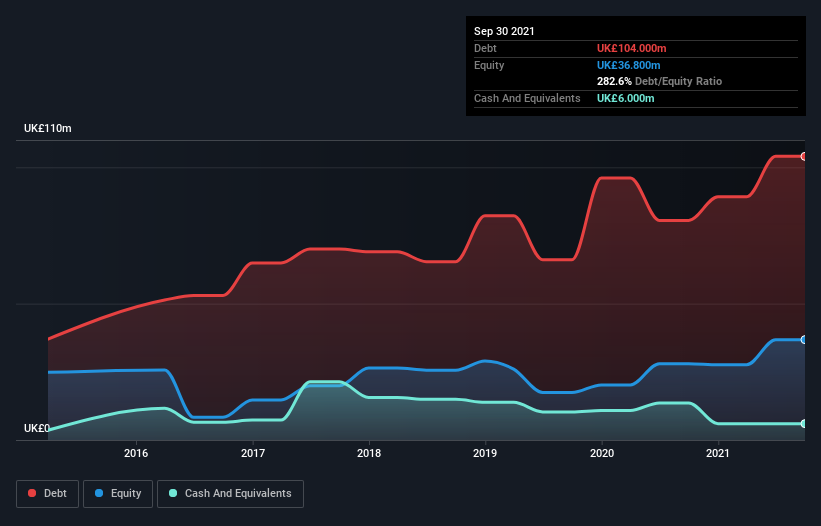- United Kingdom
- /
- Specialty Stores
- /
- LSE:MOTR
These 4 Measures Indicate That Motorpoint Group (LON:MOTR) Is Using Debt Extensively
Warren Buffett famously said, 'Volatility is far from synonymous with risk.' When we think about how risky a company is, we always like to look at its use of debt, since debt overload can lead to ruin. As with many other companies Motorpoint Group plc (LON:MOTR) makes use of debt. But the real question is whether this debt is making the company risky.
When Is Debt A Problem?
Debt assists a business until the business has trouble paying it off, either with new capital or with free cash flow. Part and parcel of capitalism is the process of 'creative destruction' where failed businesses are mercilessly liquidated by their bankers. While that is not too common, we often do see indebted companies permanently diluting shareholders because lenders force them to raise capital at a distressed price. Of course, the upside of debt is that it often represents cheap capital, especially when it replaces dilution in a company with the ability to reinvest at high rates of return. When we examine debt levels, we first consider both cash and debt levels, together.
View our latest analysis for Motorpoint Group
What Is Motorpoint Group's Debt?
As you can see below, at the end of September 2021, Motorpoint Group had UK£104.0m of debt, up from UK£80.5m a year ago. Click the image for more detail. However, because it has a cash reserve of UK£6.00m, its net debt is less, at about UK£98.0m.

How Healthy Is Motorpoint Group's Balance Sheet?
According to the last reported balance sheet, Motorpoint Group had liabilities of UK£148.8m due within 12 months, and liabilities of UK£52.9m due beyond 12 months. Offsetting this, it had UK£6.00m in cash and UK£8.90m in receivables that were due within 12 months. So its liabilities total UK£186.8m more than the combination of its cash and short-term receivables.
This deficit is considerable relative to its market capitalization of UK£276.1m, so it does suggest shareholders should keep an eye on Motorpoint Group's use of debt. This suggests shareholders would be heavily diluted if the company needed to shore up its balance sheet in a hurry.
In order to size up a company's debt relative to its earnings, we calculate its net debt divided by its earnings before interest, tax, depreciation, and amortization (EBITDA) and its earnings before interest and tax (EBIT) divided by its interest expense (its interest cover). This way, we consider both the absolute quantum of the debt, as well as the interest rates paid on it.
Motorpoint Group has a rather high debt to EBITDA ratio of 5.8 which suggests a meaningful debt load. However, its interest coverage of 4.9 is reasonably strong, which is a good sign. Importantly, Motorpoint Group's EBIT fell a jaw-dropping 32% in the last twelve months. If that earnings trend continues then paying off its debt will be about as easy as herding cats on to a roller coaster. The balance sheet is clearly the area to focus on when you are analysing debt. But it is future earnings, more than anything, that will determine Motorpoint Group's ability to maintain a healthy balance sheet going forward. So if you're focused on the future you can check out this free report showing analyst profit forecasts.
Finally, while the tax-man may adore accounting profits, lenders only accept cold hard cash. So we clearly need to look at whether that EBIT is leading to corresponding free cash flow. Looking at the most recent three years, Motorpoint Group recorded free cash flow of 46% of its EBIT, which is weaker than we'd expect. That weak cash conversion makes it more difficult to handle indebtedness.
Our View
To be frank both Motorpoint Group's net debt to EBITDA and its track record of (not) growing its EBIT make us rather uncomfortable with its debt levels. Having said that, its ability to convert EBIT to free cash flow isn't such a worry. We're quite clear that we consider Motorpoint Group to be really rather risky, as a result of its balance sheet health. For this reason we're pretty cautious about the stock, and we think shareholders should keep a close eye on its liquidity. When analysing debt levels, the balance sheet is the obvious place to start. However, not all investment risk resides within the balance sheet - far from it. For example Motorpoint Group has 2 warning signs (and 1 which is significant) we think you should know about.
When all is said and done, sometimes its easier to focus on companies that don't even need debt. Readers can access a list of growth stocks with zero net debt 100% free, right now.
New: Manage All Your Stock Portfolios in One Place
We've created the ultimate portfolio companion for stock investors, and it's free.
• Connect an unlimited number of Portfolios and see your total in one currency
• Be alerted to new Warning Signs or Risks via email or mobile
• Track the Fair Value of your stocks
Have feedback on this article? Concerned about the content? Get in touch with us directly. Alternatively, email editorial-team (at) simplywallst.com.
This article by Simply Wall St is general in nature. We provide commentary based on historical data and analyst forecasts only using an unbiased methodology and our articles are not intended to be financial advice. It does not constitute a recommendation to buy or sell any stock, and does not take account of your objectives, or your financial situation. We aim to bring you long-term focused analysis driven by fundamental data. Note that our analysis may not factor in the latest price-sensitive company announcements or qualitative material. Simply Wall St has no position in any stocks mentioned.
About LSE:MOTR
Motorpoint Group
Operates as an omnichannel vehicle retailer in the United Kingdom.
High growth potential with mediocre balance sheet.
Market Insights
Community Narratives



